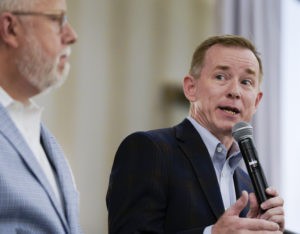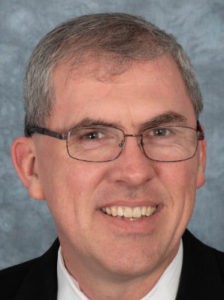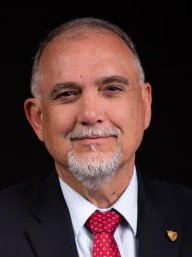Dozens of business items await messengers to next week’s Southern Baptist Convention annual meeting, but there’s only one thing on everyone’s mind. All eyes are on the SBC to see how it responds to a bombshell report on mishandling of sexual abuse.
By most accounts, this year’s annual meeting could be the most significant gathering of Southern Baptists in three decades — since the battle between a “conservative resurgence” and institutional “moderates” was decided.
That decisive turning point in 1990 was about schism. This year’s meeting is about scandal.
Anticipating a crowd
And not surprisingly, a record crowd is anticipated to attend — “record” with a caveat, because this year’ meeting will happen in Anaheim, Calif., which is far away from the SBC’s home base in the Deep South.
Already, 7,800 messengers (voting delegates in SBC terminology) are preregistered for the June 14-15 meeting at the Anaheim Convention Center, located adjacent to Disneyland. Officials anticipate another 1,500 messengers could show up, bringing the expected total close to 10,000.
But it’s not just messengers who attend the meetings. Already, another 2,465 guests are registered and an additional 1,357 vendors are signed up to work in the exhibit hall. That brings the total number of preregistered attendees to more than 11,500.
It has been 41 years since the SBC last held its annual meeting in Los Angeles.
It has been 41 years since the SBC last held its annual meeting in Los Angeles. That 1981 meeting, occurring at the beginning of the previous schism, drew 13,529 messengers. But every other West Coast convention since then has attracted lower-than-usual numbers: 5,018 in Phoenix in 2017, 4,852 in Phoenix in 2011, 7,015 in Phoenix in 2003, 7,015 in Salt Lake City in 1998. The only exception was the 20,411 messengers who descended on Las Vegas in 1989 at the peak of the denominational schism.
But until recently, attendance at annual meetings has been on the decline regardless of geography. If 10,000 messengers show up in Anaheim, that will be the second-largest registration in more than a decade — outpacing meetings in SBC strongholds like Birmingham, Dallas, Houston and New Orleans.
Why all the interest?
There already was intense interest in this year’s annual meeting because — once again — two groups are vying to control the future of the denomination. And that happens through the election of a president, who has vast powers to influence appointments to trustee boards of all SBC agencies and institutions.
The recent report of the Sexual Abuse Task Force mandated at last year’s convention has merely added additional layers of interest. And at some point, the two issues overlap, because whoever is elected president will help shape the denomination’s response to the sexual abuse report.
On that matter, there definitely is more than one school of thought.
The candidates and the report
For context, remember that last year’s hard-fought presidential race was decided by just a bit more than 500 votes — among the 15,000 messengers registered and eligible to vote. That contest highlighted two very different visions for where the SBC should head, including how it should respond to sexual abuse claims.

Mike Stone speaks during an event at the SBC annual meeting in June 2021, while Ed Litton looks on. Litton defeated Stone in a run-off election for SBC president. (Baptist Press)
The narrowly defeated candidate, Mike Stone, represents a group that believes the SBC has drifted into liberalism and needs to be pulled back hard to the right. The winning candidate, Ed Litton, represents a more centrist (within the SBC) and institutionally loyal perspective.
That same battle is back this year, but with less charismatic candidates. Technically, there are three announced candidates, but by all insider accounts it will be a two-person race — unless a fourth candidate enters the race.
Retired SBC missionary Robin Hadaway is a long-shot candidate, a reality even he acknowledges. And he has been largely missing from the debate over the sexual abuse report. His platform is missions.
The other two candidates are Texas pastor Bart Barber, who has established a resume of service to the convention as a trustee and committee member, and Tom Ascol, a Florida pastor who has been at the far-right of the SBC for decades and has adopted as a campaign slogan, “Change the direction.”
Barber has a track record of calling for greater standards of reporting sexual abuse in churches and has been supportive of the SBC Sexual Abuse Task Force’s work. If elected, he would be likely to follow the path set by Litton, who appointed the current task force and has defended its work against detractors.
Ascol has supported the concept of the sexual abuse investigation but has opposed the way it was done and has critiqued the amount of attention it has drawn. He recently said it was “not wise” for the SBC Executive Committee to waive attorney-client privilege for the investigation.
Institutional loyalty versus house cleaning
Barber has a history of institutional service within the SBC that Ascol does not. Ascol has devoted himself to teaching and leading mainly within the context of the Reformed tradition that has resurfaced within the SBC over the past 30 years. He was a Baptist Calvinist before it was hip to be a Reformed Baptist. For decades, that kept him on the far-right fringe of the SBC.

Bart Barber
Barber, meanwhile, has held leadership roles not only within the SBC but also within the Southern Baptists of Texas Convention — the group that broke away from the Baptist General Convention of Texas in 1998 in order to be more loyal to the SBC. He also will have a high-profile role at this year’s annual meeting as chair of the Committee on Resolutions.
He served on the Resolutions Committee last year, preached at the SBC Pastors’ Conference in 2017, and served as first vice president of the SBC from 2013 through 2014. He served 10 years as a trustee of Southwestern Baptist Theological Seminary in Fort Worth, Texas, and was on the board during the tumultuous firing of former seminary President Paige Patterson.
Barber presents himself as a policy wonk, often consulted about Baptist polity and parliamentary procedure.
On the other hand, Ascol wants to clean house. He believes the SBC bureaucracy is bloated with too many leaders who are more loyal to their institutions than to the Bible. In his view, a right and narrow belief about the Bible will bring everything else into line.
On a recent episode of the “Gloria Rios in the Morning” podcast, distributed by American Family Radio, Ascol said his top priority as president would be “to call for the kind of changes that we need to call for spiritually … (and) No. 1 on my list is we need to return to a fear of God. I don’t think we have one problem in the SBC that a genuine humble return to fearing God wouldn’t solve.”
In the same podcast, Ascol called for “biblical order” in SBC churches.

Tom Ascol
“Some of us have known for a long time … that our churches need to be biblically ordered and we we’ve dropped the ball significantly. … We claim to believe in a regenerate church membership, that is, a person has to have a credible profession of faith to be a part of our church, they have to be willing to follow Christ and if they’re not willing to do that then we correct them as Matthew 18 says we must do. … Obviously that is not happening because we’ve seen churches with lots and lots of people on their church rolls that can’t give any account to the membership they exist anymore, much less of their following Christ in active obedience.”
This is important, Ascol said, because “if you have a well-ordered church … (when) a person commits a sin he will be dealt with by the church.”
He emphasized the difference between a sin and a crime. “We’ve got to distinguish between sins and crimes. God has ordained authority in the state to handle crimes, and he’s ordained authority in the church to handle sins. The church is not equipped to adjudicate crimes, and the state is not equipped to adjudicate sins.”
While “some sins are crimes and some crimes are sins,” churches must call the police first anytime a crime has been committed. If churches feared God and obeyed the law, they would notify police immediately when sexual abuse occurs, he said. And that would shut down the problem.
“A lot of these issues would have been dealt with on a local church basis, but our churches need to be biblically restored under the leadership of Christ to take his word seriously and to live the way he’s told us to live,” Ascol said.
Two different visions
Anywhere outside the SBC, both Ascol and Barber would be viewed as extremely conservative theologically and politically. Within the SBC, Barber is a centrist and Ascol represents the far right.
Neither is a slam-dunk candidate, and neither has widespread name recognition among the messengers who will gather in Anaheim next week. For decades, the SBC has elected megachurch pastors as president — men with high name recognition and national visibility.
The election of officers is scheduled to occur less than an hour after presentation of and debate over the Sexual Abuse Task Force report.
The election of officers is scheduled to occur less than an hour after presentation of and debate over the Sexual Abuse Task Force report. One of the recommendations from the task force is to create a new task force to carry on this work — a task force that would be appointed by the new SBC president.
That’s just one of the many ways the person serving as president will have influence over the denomination’s immediate response to the sexual abuse crisis.
And then there are resolutions
As if all this wasn’t enough for one SBC annual meeting, the perpetual wild card is the resolutions process. Much of the headline controversy generated out of previous annual meetings has come from resolutions, which are nonbinding statements of the beliefs of messengers gathered that year in that place.
Despite being nonbinding, some resolutions take on the force of doctrine within the denomination.
Ascol and his allies have criticized the Resolutions Committee in years past for blocking or watering down resolutions they’ve proposed that would have taken a hard line on a variety of social issues. Last year, Ascol’s brother, Bill, led an end-run on the Resolutions Committee and got messengers to adopt a hardline statement on abortion that the committee had declined to bring forward.
We do not yet know what resolutions the committee will put forward this year but it seems likely there will be at least one on sexual abuse in churches.
And remember, this year’s chair of the Resolutions Committee is Bart Barber, which will place him in an unusually high-profile dual role as resolutions chair and presidential candidate.
Related articles:
SBC presidency is a three-way race again with Barber announcement
A surprising nominee for SBC presidency announced in a surprising way


